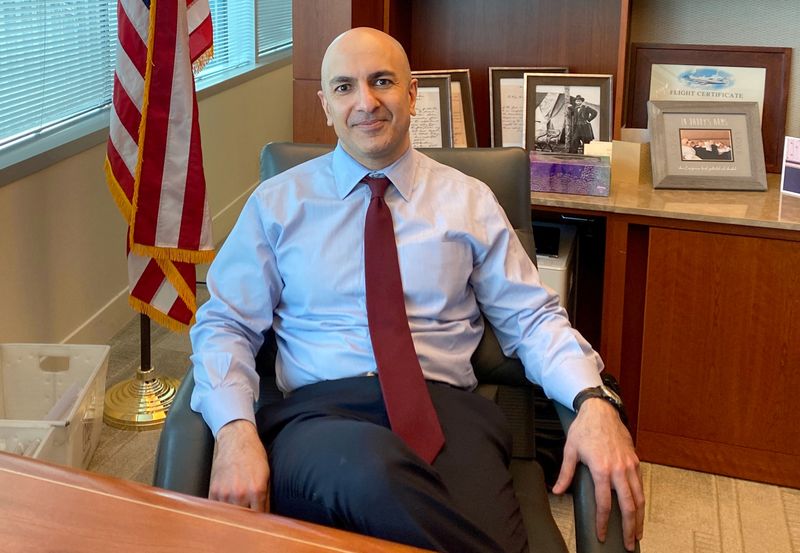(Reuters) -Two of the U.S. central bank's most dovish policymakers said Tuesday they expect to get more clarity on the post-pandemic economic outlook by next summer, when the Federal Reserve is expected to finish winding down its asset purchases.
Whether that clarity leaves them convinced interest rates should stay at their current near-zero level for another year or more, or moves them to join the half of their fellow Fed policymakers who support more immediate rate hikes, will depend on two main factors, their remarks suggested: if inflation has begun to abate as they expect, and if workers are flooding back into the labor force as they have long hoped.
Minneapolis Federal Reserve Bank President Neel Kashkari, who in September was the Fed's only policymaker to call for leaving rates at their current near-zero level until 2024, said Tuesday he is keeping an "open mind" on monetary policy.
With the latest COVID-19 surge fading in the United States but still disrupting economies globally, "we are getting these mixed signals out of the economy," Kashkari said at an event at University of Wisconsin-Eau Claire.
Wages are rising, for instance, but the U.S. economy is supporting an estimated 5 million to 7 million fewer jobs than would have been expected had there been no COVID-19 crisis, and the percentage of the population who are working or want to work has stalled at 61.6%, well below pre-pandemic levels, data shows.
Inflation is well above the Fed's 2% target, driven by factors that ought to be temporary -- supply-chain disruptions as well as a surge in demand as the economy reopens -- but are proving to be longer lasting than earlier thought, Kashkari said.
"I'm optimistic, in the next three, six, nine months we will get a lot more information" and clarity about whether the millions who left the workforce during the pandemic will return, he said. If they don't, "that's going to give me more concern that the high inflation readings that we've been seeing may be sustained."
Earlier Tuesday, San Francisco Federal Reserve Bank President Mary Daly also set her clock to mid-2022, telling a National Association of Business Economists virtual meeting, "let's be patient" on policy and wait to see whether inflation fades when the pandemic does, as she expects.
Raising interest rates too soon, she said, will do very little to reduce prices but will "absolutely" reduce the pace of job gains.
"That's too much risk to take when we don't have any indication that these are today persistent trends," she said.
"I'm looking at the summer of 2022 is when we should - knock on wood, no more variants, no more Delta surges - get some clarity" on whether inflation will persist post-pandemic and if the labor supply is truly tight, as many employers say it is, or if higher wages and an improving public health environment bring more people back to the job market.
In the meantime it could be a "challenging time" as consumers have to pay more for gasoline and food and other necessities, she said.

On Monday, Chicago Fed President Charles Evans, who also leans dovish, said he too thinks inflation is being driven mostly by COVID-19-related supply shortages that will fade. But he said he's less sure than he had been three or four months ago, and appeared to set a more rapid timetable for proving his expectations out.
"By the spring we are going to know a lot more about this, and if I'm still kind of making the same excuses, boy they better be really good excuses because it's just not going to sound quite right," he told reporters.